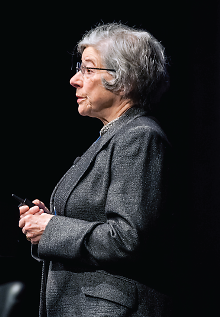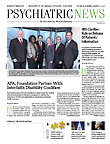As medicines intended for multiple psychiatric disorders become available, new treatment for feeding and eating disorders lag behind.
In February, Katherine Halmi, M.D., a professor emerita of psychiatry at Weill Cornell Medical College, spoke to nearly 1,400 psychiatrists at the Nevada Psychiatric Association’s 19th Annual Psychopharmacology Update on the latest research, challenges, and changes in the area of feeding and eating disorders.
“Pharmacological treatment is not the first line of treatment for feeding and eating disorders,” Halmi said at the conference. In an interview with Psychiatric News after the session, Halmi noted that the Food and Drug Administration has not approved any medication for treating a feeding or eating disorder.
“There have been studies comparing antidepressant drugs, such as serotonin reuptake inhibitors, with cognitive-behavioral therapy [CBT] in individuals with bulimia nervosa,” she said. “These studies have found CBT to be superior to psychopharmacology-based therapy in treating this particular illness.”
Halmi said that other psychopharmacological agents, such as the atypical antipsychotic olanzapine, are currently being studied as a treatment option for anorexia nervosa.
“Evidence from 20 randomized, controlled trials shows that olanzapine is effective in inducing weight gain and reducing anxiety symptoms in those with anorexia nervosa. The problem is that patients can now go online to view the complications of the drug. But because weight gain is one of these complications, these patients choose not the take the medication.”
Halmi told Psychiatric News as well that it will be extremely difficult to get medicines approved for treatment of particular feeding and eating disorders because of the small sample size associated with clinical trials for such illnesses.
“To recruit individuals diagnosed with anorexia nervosa or bulimia nervosa is almost impossible. In the 30 years I’ve been in the business, nothing has worked very well. Currently, researchers are trying motivation ideas, but so far nothing has really emerged to be effective. The core dynamic of the illness is egosyntonic—patients are afraid to give up their behavior.”
Halmi pointed out that the most effective way of treating individuals with eating disorders is to initiate family therapy before the patient reaches age 18.
“After age 18, the patient has legal rights and can refuse to enter treatment,” Halmi explained. “If the [adult] patient becomes very ill, the family can carry out legal procedures to have the patient court-ordered into treatment. However, once the illness progresses to such magnitude, it is usually too late.”
Though treatment for feeding and eating disorders poses multiple challenges for patients and physicians, Halmi expressed hope for the future. She noted that recent modifications made to the criteria for feeding and eating disorders in DSM-5 can steer the field in the right direction.
“Now eating disorders are all labeled under one section. . . . Amenorrhea is no longer a criterion for anorexia nervosa—this never provided accurate data during research.” In addition, she pointed out, “a patient can now qualify for a diagnosis of bulimia nervosa with binging and purging once a week for three months instead of twice a week for three weeks. These are all good changes that I’m enthusiastic about and will be beneficial for better serving our patients.” ■

